Image: Giorgia Prates
MOVE: Subcultures, Movements, Aesthetics is a series of documentation, a critical-collective output of the “Researching Subcultures and Aesthetics Postgraduate Symposium” that took place at National University of Galway Ireland in September 2019. This event was organized as part of the Punk Scholars Network event series, with the aim of bringing students and early career researchers who work on subcultural movements and arts together and offering a space to connect sociological studies on resistance with the more Humanities-oriented discussions around countercultural aesthetics.
The three episodic clusters in the series are designed to reflect the gaps and connections between disciplines, aiming to demonstrate the necessity of re-conceptualizations and how each paper can be thought as both specific to itself and part of a story, an episode of a collective research chapter. Topics ranged from neglected subjects and refusals in the literary world to the politics of independent music and punk subculture, from experimental filmmaking practices that blur the borders of American video art and cinema to the occupy, diasporic and subcultural movements in Romania, Brazil and the UK.
MOVE will run the course of autumn 2020 while the covid-19 is fluctuating in different time-spaces, gesturing towards new ways of moving under restrictions. Thanks to all the contributors, Moore Institute at NUI Galway and Punk Scholars Network for support and special thanks to Abram Foley, editor of ASAP/J. You can access all MOVE essays here.
– Temmuz Süreyya Gürbüz (Editor)
: ;
O mundo modifica para os que reagem.
[The world modifies for those who react.]
Carolina Maria de Jesus
A nossa luta é todo o dia / Educação não é mercadoria
[Every day is our fight / Education is not a merchandise]
There are many proposals on how to use a classroom, but they seldom change some of the presuppositions that surround education. We hardly come across sleeping, for example, as an educational practice. Nor would toothbrushes and cutlery be considered as necessary as pencils, textbooks, and chalk for study purposes. As obvious as it sounds, the understanding of education as an external supplement to daily life is evidence of how educational spaces re-install public vs. private segregation and participate in the status quo machinery.
Undeniably, the educational system is an efficient gear in the ideological state apparatus. It legitimises inequality by unevenly distributing credentials, entitlements, income, cultural, social and symbolic capital. The maliciously meritocratic hierarchisation of people is not everything a school system does, however. A pedagogy of the oppressed can teach to transgress – as long-held practiced hopes have proved. Beyond the presumptuous promise of enlightenment, the educational disciplinary dispositive cannot fully prevent the existence of the undercommons. Against all odds, everyday relations are capable of being reshaped according to significant undercurrents and circumstances that affect our lives.
What happens when people do use a mattress/pillow in a school space among other classmates and colleagues? Or when they join the cooking committee, become responsible for sweeping the floors or handling security in their own schools/universities? What happens when students get to decide what a regular school day should be constituted of? When the syllabuses, schedules, courses, grades, and teaching materials are determined by the collective need of mobilization against an oppressive government? To put it another way, what happens during a school occupation?
Uprisings entail the intense politicization of daily life. As Silvia Rivera Cusicanqui describes it: “In these delirious moments of collective actions, what is experienced is a change in consciousness, identity and ways of knowing, in the ways of conceiving politics.”1 We want to expand on the far-reaching meaning of this delirium, presenting here our (perhaps romanticised) testimonio of the occupy movements that transformed educational spaces in Paraná (Brazil) in 2016.

: :
In August 2016, a state coup ended Dilma Rousseff’s mandate and empowered Michel Temer to push the Brazilian federal government deeper into the neo-liberal bottomless pit. His first constitutional action as an illegitimate president attacked the secured allocation of public services, contravening the national constitution by proposing a 20-year budget-freeze on financial spending towards health and education.2 At the same time, he issued a policy change in secondary education that aimed to impoverish the curriculum (withdrawing art, philosophy, physical education, and sociology); abolish evening-classes (increasing the mandatory classroom-hours), and segregating the system to impose work-training for some and propaedeutically education for (privileged) others.3
Neither teachers, principals, parents, unions, local governments nor students were consulted during the making up of the new policies. The new authoritarian measures were especially detrimental to working-class students.
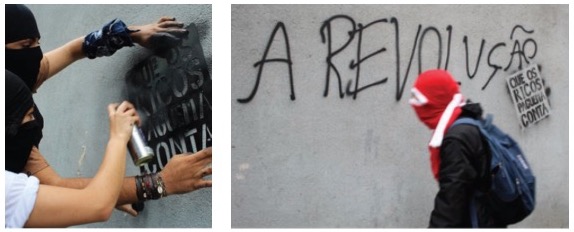
During September 2016, in several locations in Paraná and other states, students and educators rallied denouncing the perverse impacts of the educational reforms. Protesters were fully aware that such proposals were based on a commodified understanding of education that strategized for the increasing of social inequality. The demonstrations were not taken seriously by the government, who ignored the demands, nor by the traditional media, that unabashedly overlooked street rallies and demonstrations, failing to report the movements and deflating the political debate.
On October 3rd, more than 200 students occupied the Colégio Estadual Arnaldo Jansen (in São José dos Pinhais). This ocupa was immediately publicised on social media by the students themselves, and from then on, the movement spread like a sparkle.
In two weeks, 850 high schools, 14 universities and 3 public buildings were occupied solely in the state of Paraná, and at least 1100 in the whole country during the following month. Taking possession of the space, regulating the access and interrupting the normal activities, the movement achieved greater visibility and disrupted ordinary teachings and political dealings.4
Ocupas in Paraná employed a tactic that had already been tried out before in school occupations in Chile and other Brazilian states like São Paulo. This form of action was characterized mainly by changes in the decision-making process, founded on the concept of horizontality which prioritizes the exercise of shared responsibility and collective organization.
‘The enjoyment of horizontality was itself a horizon’. (Ana Eduarda)5
A large share of the daily time in the occupations was dedicated to meetings and assemblies. This responded to the need to collectively address the pragmatic organisation, including the need to create the collectivity itself. The sentiment of ‘us’ was stronger within the group of people that composed each occupation, but the network of communication using social media and inter-institutional gatherings developed a wider atmosphere of euphoria and solidarity.
The feeling of community sprouted from the recognition of being on the same side of the political struggle. Having common enemies, facing the same threat, and sharing the responsibility to react against the state, the ocupas created a “we”. We filled up the streets with people mirroring and cheering each other, recognisable by badges, chants, and a glowing aura emanating from the mixture of anger and hope. The degree of affection and intimacy increased to a point that family metaphors would be used among ocupas in communicating their relations.
Most occupations were very conscious of their autonomy and critically detached themselves from the political parties, unions, and traditional student entities. In fact, the ocupas demanded not only the prevention of the arbitrary implementations of authoritarian education policies, but particularly the right to participate in the decision-making processes, especially in the daily organisation of the educational space itself.
During the occupations, actions of disobedience gradually took shape when the authorized, accepted and defined forms of using the educational environment were disordered. The unprecedented moments prompted various experimental methods of occupying the school space: mattresses in the library, musical instruments in the kitchen, theatre performances in the courtyard, and mandatory syllabuses discussed in circles of dialogism.
The learning territories, previously standardised by institutional prescriptions, were proven versatile simply by the ocupas claiming responsibility for the maintenance of their educational space and deciding how to develop it together. The promise of learning expanded beyond tutelage and was not constrained by the classist division of manual vs. intellectual labour.
“So much so that in here now during the occupation we are doing the work of the cleaning ladies, we are cooking for all these people, we are doing the work of the teacher here, I think that nobody would come here if they obliged me, do you know what I mean? We are coming willingly so I think that is the main point”. (Juliana)6
Daily chores performed collectively in the school/university space transformed bodies and relations. The cooperative care for the space and for one another created a deeper sense of belonging and a reconstructed understanding of education. The meanings of the political uprising were constructed over shared bread and the intimacy of those who dreamed the same dream or dreaded the same present. Commensality itself became a code of learning through sharing. Every cook governing proved to be much more fruitful than an ignorant schoolmaster. The temporality of social relations expanded towards increased inclusivity. Expansive classrooms became viscerally aware of the pervasive feature of gender, sexuality, race/ethnicity, and class structures.
“The occupations brought knowledge beyond what is acquired within classrooms, in addition to what we come across in textbooks that never showed us the true story. (…) We put boys and girls in the kitchen and in cleaning because our ideology suits with gender equality even though simple tasks we managed to pass the deconstruction, in the occupation there were black men and black women, girls, boys, and LGBT people with the only hope to see the world around us to change!” (Mariane)7
It seems relevant that the ocupas happened after a decade of democratization of Brazilian public education. In primary and secondary schools, the expansion of access to schooling was strengthened by attempts to decolonise the syllabus. Teachings of African, Afro-Brazilian, and Indigenous history and culture became mandatory8; Sociology and Philosophy were included in the secondary school grid.9 In ‘higher’ education, quotas to promote access of racialised and impoverished students to public universities transformed the demographics of what had been an overwhelmingly white and elite student population. Meritocratic ideology was challenged from within the system.
by Giorgia Prates
No survey was conducted to bio-politically label and identify participants. It is nonetheless possible to resort to self-assessment based on asystematic samples of intuitive statistics. They demonstrate that ocupas consisted mostly of non-white, non-male, and queer identified people. Amefrican people challenging the ideology of racial democracy. Politicised sociabilities intersecting feminisms, anti-racism, anti-homophobia, and anti-transphobia guided interpersonal relations and the contestation of the conventional pedagogy.
“In my day-to-day listening to unwanted comments and being socially excluded was normal and I accepted. Not that I thought it was right, but I was afraid of how people would react or what they would think of me. Last year with the occupy movement (for the fight against high school reform and the freezing of funds in education and health) I came across a place where prejudice and discrimination were unacceptable. There I met my rights as a citizen, and I was not afraid to be who I am. And mostly it was where I used the ladies’ restroom without fear. / Being Trans and fighting for your rights and education was something that inspired me to continue my fight and accept myself more and more. Now when I hear something on the street, I really don’t care, and I know I don’t have time to waste dealing with transphobic and misogynists. I will always carry in my heart the struggle of women that I admire and respect a lot. / Call me Joana.” (Joana)10
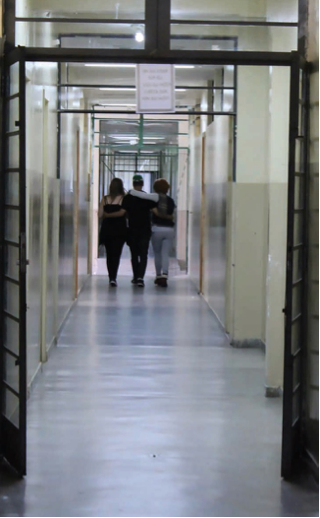
The principle of horizontality that persisted as the active mechanism among the ocupas’ disrupted the conventional relations of power and the traditional and hierarchical forms of decision-making. While not all the principals, teachers and lecturers were completely willing to reconsider the(ir) role of authority, some did, nonetheless.
“I saw a new pedagogy being practiced, led by the students, in form, content, language. It filled me with hope and strength. No, it will never be the same again, neither we nor they.” (Monica)11
The practice of horizontality revealed that compliance with the expected patterns of behaviour in a position of power crystallises not only the social structures but subjectivities. We learned in the ocupas that dislodging the unquestioned habituated patterns in society through reshaping relationships offer us an opportunity to revise our sense of self.
There is a shallow dimension to this epiphany: that relations, subjectivities, and social structures are intermingled and change together. Despite its obviousness, or because of it, the magic lays on (finally) partaking in such a process. A whole range of emotions and conditionings prove to be effects of and accomplices with the establishment. Shame, shyness, or self-doubt lose its hold when the collective demands someone to step into the microphone. All of a sudden, whatever is attempted is more important than ideologically cultivated self-limitations.
“Education and art are here, not as subjects in a curriculum, but as ways of life deconstructing the meritocratic and bureaucratic schooling model that produces [school] evasion. Spaces where the collective/community surpasses the individual/competitive, revealing the production of life in relationships and in artistic attitudes. We are occupants, each one in hes own way, offering hes time, hes courage, hes support, hes energy, hes body giving visibility to these actions and hes increasingly powerful speeches in the search for liveable lives.” (Regina)12
The ocupas uncovered that it is possible to deinstitutionalise the “right” time for activism, as well as the narrow understanding of education. Allegedly non-productive periods of the day can be constructive for different types of encounters. Living the radical present freed from pre-regimented schedules, people could dedicate themselves to politics for longer periods of time and with full attention.
“That production of knowledge that I imagined at the beginning actually took place; we spent the nights talking (…) The chats in the evening went from ten at night until four or five in the morning. There was no time limit, the bell was not going to ring, things were not fragmented, there was no rush, there was freedom to express ideas, opinions.“ (Unnamed)13
This unregimented time made possible to collectively comprehend the parliamentary and legal procedures as well as learn the names of the politicians, state ministers, and judges influencing the educational decisions. Political understanding is a lesson that requires time, dedication, and engagement. The maturation of political practice as a collective responsibility was gradually shaped by and in the ocupas.
by Giorgia Prates. Nurturing communal solidarity
Solidarity was widespread and ocupas received daily donations from the surrounding communities that included mattresses, blankets, cleaning materials, loads of food and messages of support, as well as labour from people willing to organize workshops, performances, music events, and provide legal assistance.14 As may be unavoidable in an unequal society, some of the most central and/or affluent schools receive more resources. The ocupas consciously organised to redistribute such resources.
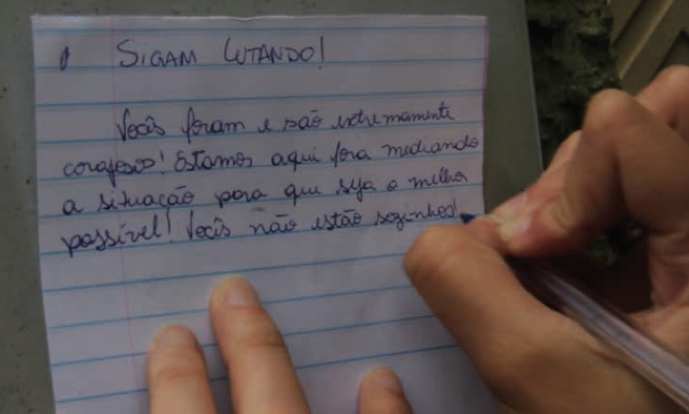
Not everybody supported the ocupas. Some hastily referred to them as mere puppets of “greater forces” (meaning left-wing parties) echoing most radio programs, printed newspapers, and daily television shows.15
“And even committed, / We were labelled / Like stray and idle.” (Camille)16
The occupations resisted all October. The legal battles contended the right to protest against the requests of repossession of the occupied buildings. The public educational authority tried to collect personal information of the people who participated in the occupations while threatening to fine student’s families. The ocupas were also constantly harassed by the violent actions of “desocupas” – a term that describes the right-wing groups attacking the occupations (such as the Movimento Brasil Livre)17 – and dissatisfied members of the school community. The police were oblivious in cases of violence so the ocupas had to organise their own protection.
“My occupation started on October 17th, 2016, and I report here some problems and repressions that we had during the occupation, to begin with, there were only 8 of us occupying, a fairly small number considering the other occupations, during the occupation we cleaned and painted the school in a different way, because the school had always been completely lifeless and blue, we used some colours and drawings on the walls and we painted the boys’ restrooms in pink and the girls’ in blue to deconstruct this gender thing a little bit, we invited the students’ parents for a meeting on the 22nd to explain the reasons for the occupation and what we were doing at the school, the parents came to the school very aggressively and just interested in knowing if the occupation would end or not and there was no way to talk to them, they wanted us to leave at that moment or they would “occupy our occupation”, they then started wanting to attack a teacher who went to talk to them and when I went to defend her a father, yes, a father slapped me in the face, that’s when we had to retire into the school and call other teachers to talk to those parents, after that what affected us were campaigns made through the media, made by a teacher who opposed the occupation, he made publications offering higher marks to students who would agree to invade our occupation and also published how and where [it would be feasible] to invade the school (…) From the 28th to the 2nd of November, we suffered several external attacks, people throwing firecrackers, bombs, and stones inside the school, cars full of men who stopped in front of the school at night and kept forcing the gate and shouting that “false revolutionaries have to die”, on the 1st [of November] we asked for help from other occupations because the firecrackers were frequent and we were only 6 people, that day there were about 30 people from different occupations to help us, on the 2nd it started in the morning until the night with stones, sticks, and firecrackers at the gate, it was when around 8 pm we discussed and decided to vacate, we left on November 2nd, 6 people completely tired, but with the feeling that we tried to fulfill our duty, we fought against the MP746 and the PEC55 , we are not silent and we will not be silent, those were some of the problems in our occupation.” (Biatriz)18
All throughout the occupations in Paraná, the protesting voices shout out “Firme?” (Steady?) as a question to be answered which became the motto of the movement. Also, “Firme!” could be shouted as a confirming echo. This was an especially useful chant in dangerous moments when buildings were under attack and the ocupas needed to make sure of the presence of supporting people holding the ground outside the gates.
Countering the spread of fake news, ocupas created an autonomous narrative by the steady streaming updates on social media, based on the tactics of horizontality. Most of the ocupas had a ‘communication committee’ that planned how to advertise their demands and actions. As Ana Carolina Spreizner explains, even though not all ocupas had access to the internet, the ones who did intensely used social media: “In these pages it was possible to show the activities performed by the students, which always involved the renovation of the [school] space, reflection on how to make it better and also workshops and classes that made them learn more than in the traditional Brazilian teaching system. Having its own communication channel deepened the occupation’s autonomy.”19 Through social media, contesting biased accounts, and selecting the sources of information that could be trusted, ocupas became directly involved in the struggle for media democratization.
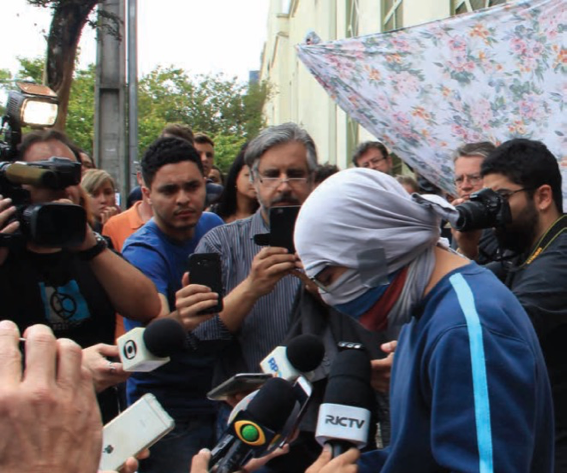
The desire to self-narrate, to make sure the experience was registered was probably triggered by an acute feeling of living an exceptional situation.20 There was urgency in sharing the incredible new discovery that life can be lived differently, that things can change, and that there are loads of people out there willing to engage in disrupting the world as it is.
Ocupas in Paraná produced many cultural materials: countless political speeches (including a viral one by Ana Julia Ribeiro), at least three documentaries (directed by Carlos Pronzato, Maira Kaline Januario Cabral, Monica Ribeiro), books (collecting memories and images), chants, songs, parodies, and a considerable archive of pictures, including the ones accompanying this text (all photos published here were produced by photographers who were part of the movement).21 The ocupas tried not only to maintain the flux of optimism and exchange knowledge, but also to counterbalance the hegemonic negative narrative sustained against them by the mass media.
*
It is striking how the term “education” does not have a plural form. Or how it can be inconsequently used without an adjective. It is not easy to find a grand consensus on the meaning and practice of education. Except that education seems to be (ironically) the only real path to ‘progress’ and that all of us should desire it for everybody everywhere all the time. Any other aspiration with such overwhelming everlasting overstretching universal aim would be called totalitarian or colonialist. Or both.
And still, we crave education. You definitely can’t blame the youth of today.
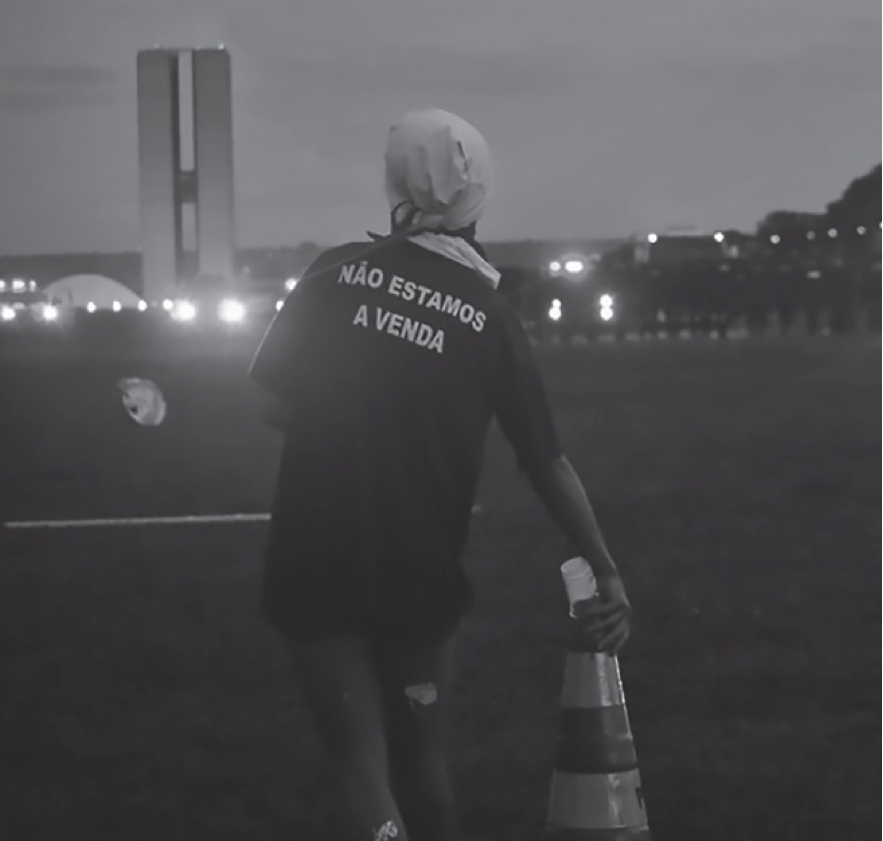
8 by Kauanna Mahara N. Antoniacomi. The t-shirt reads: “We are not for sale”, in the background stand the balance-inspired Modernist building of the National Congress in Brasilia.
None of the national demands held by the 2016 ocupas in Paraná were accomplished. The budget for health and education was frozen for 20 years; the secondary school authoritarian reform was approved; the occupations were dismantled; the schools and universities re-established conservative normality. The movement failed in changing the education system and preventing the totalitarian reforms.
From a more optimistic perspective, not all demands of the ocupas’ were aimed at the state and it is probably self-defeating to measure our accomplishments using the rules of the powerful.
We have witnessed that an occupation based on collective action can de-institutionalize the rules of coexistence, dislocate social roles, question hierarchies, form new social bonds and mend subjectivities.
It can create an unexpected and unpredictable palette of human relations, based on an anarch-meticulous politics that does not only imagine different worlds are possible but act upon some of its promises from the get-go. The revolution will not be over there.
Ocupas showed us that the transformation of spaces is the transformation of relationships and the transformation of relationships is the transformation of people (not necessarily in that order). It teaches a different education altogether, something that surpasses state and colonial syllabus.
Spaces can be evicted. People and relationships cannot. Perhapiness, there is something to be learned from that.
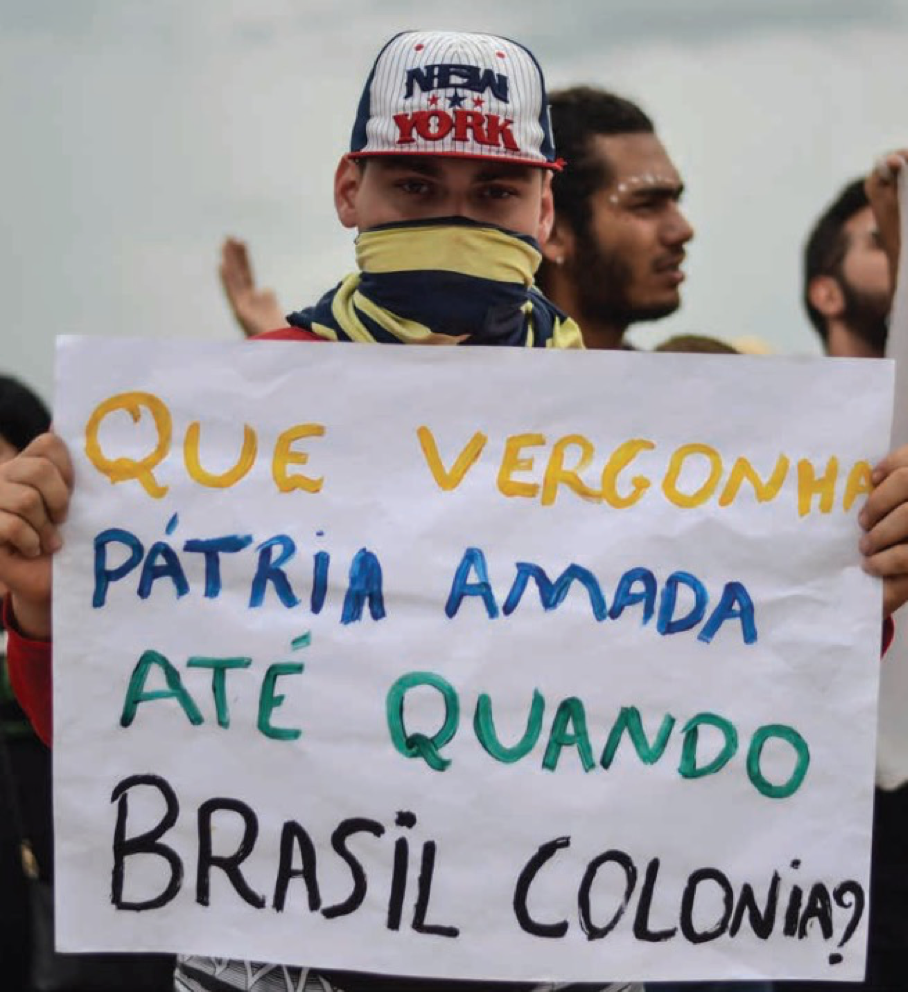
by Kauanna Mahara N. Antoniacomi. The poster reads: “what a shame / beloved homeland / for how long / colonised Brazil?”
Endnotes
- Our translation: “En esos momentos delirantes de acción colectiva, lo que se vive es un cambio en la conciencia, en las identidades y formas de conocer, en los modos de concebir la política.” In: Cusicanqui’s Ch’ixinakax utxiwa was partially published in English. The complete version can be read in Castellano/Aymara.
- Constitutional Amendment Proposal (PEC) 241 which became PEC 55, 2016.
- The Provisional Measure (MP) 746 changed the structure of secondary schools through the promotion of full-time education. The minimum annual high school classroom time was increased to 1,400 hours. Teaching Portuguese and Mathematics remained mandatory whilst Arts, Physical Education, Sociology, Philosophy and Spanish would be ‘elective’ according to the availability of teaching staff in each school. The MP 746 also defined that secondary school curriculum would be organised by the National Common Curricular Base (BNCC) composed of different formative itineraries alternatively aiming at propaedeutic learning (in some schools) or technical and professional training (in others), therefore widening the educational class gap.
- Machado, Valeria Floriano (2018) “De quem é a escola? A quem a escola pertence?”: estudantes secundaristas e a ocupação das escolas no Paraná, em 2015.
- Our translation: “E por falar em poder, esse feixe que ultrapassa as relações, como manter o convívio diário em uma experiência inédita, permeada por todos os tipos de pressões sem ceder às tentações dos podres poderes? A resposta dos estudantes secundaristas veio na forma de uma nova forma de organização, na qual o apreço pela horizontalidade eram em si mesmo um horizonte. (…) Mas o simples fato das ocupações terem deslocado papéis e dos alunos terem experimentado uma autonomia sem igual já é um legado e tanto. A aniquilação do poder é não só uma prática diária, como também um exercício de delicadeza, ainda que para tanto seja necessário elevar a voz em tom de ocupação. Resistimos, a que será que se destina?” (Ana Eduarda Diehl in Prates et al. Ocupar e Resistir. 2017: 141).
- Our translation: “Tanto que a gente aqui dentro agora durante a ocupação estamos fazendo o trabalho das tias da limpeza, a gente tá cozinhando pra esse povo todo, a gente tá fazendo o trabalho de professor aqui dentro, eu acho que ninguém ia vir aqui se mandassem vim, sabe? A gente está vindo por vontade própria então acho que esse é o ponto principal.” (Juliana, 16 years old, quoted by Mariana Prohmann in Prates et al. Ocupar e Resistir. 2017: 27).
- Our translation: “As ocupações trouxeram um conhecimento além do que se adquire dentro de salas de aula, além do que deparamos com um livro de didático que nunca mostrou à verdadeira história. Aprendemos juntos a respeitar as diferenças as diversas opiniões que existe, conseguimos se desconstruir altamente perante uma sociedade que tem raives amargas que é o machismo, mostramos a todas e todos os estudante secundarista que mulher tem poder, que mulher veio ao mundo não para ser oprimida ou ficar na cozinha, mulher veio para brilhar e ser livre. Colocamos meninos e meninas na cozinha e na limpeza porque nossa ideologia convém com a igualdade de gênero mesmo sendo uma simples tarefas conseguimos passar a desconstrução, na ocupa existiu negros e negras, meninas, meninos e LGBTs com uma única esperança ver o mundo a sua volta mudar!” (Mariane Feltrin in Prates et al. Ocupar e Resistir. 2017: 101).
- Laws 10.639/2003 and 11.645/2008.
- Law 11.684/2008.
- Our translation. “No meu dia-a-dia escutar comentários indesejados e ser excluída socialmente era algo normal e eu aceitava. Não que eu achasse certo, mas eu tinha medo de como as pessoas reagissem ou o que elas pensariam de mim. Ano passado com o movimento das ocupas (pela luta contra a reforma do ensino médio e o congelamento das verbas na educação e saúde) eu conheci um lugar onde o preconceito e discriminação era inaceitável. Lá eu conheci os meus direitos como cidadã e eu não tinha medo de ser quem eu sou. E principalmente foi onde eu usava o banheiro feminino sem MEDO. / Ser Trans e lutar pelos seus direitos e pela educação, foi algo que me inspirou a continuar minha luta e me aceitar a cada dia mais. Agora quando eu escuto algo na rua, eu realmente não me importo e sei que meu tempo não inclui me relacionar com pessoas transfóbicas e machistas. Sempre levarei em meu peito a luta das mulheres pela qual eu admiro e respeito muito. / Me chame de Joana.” (Joana in Prates et al. Ocupar e Resistir. 2017: 21).
- Our translation: “Vi sendo praticada uma nova pedagogia, protagonizada pelos/as estudantes, na forma, no conteúdo, na linguagem. Isso me encheu de esperança e força. Não, nunca mais seremos os/as mesmos/as, nem nós, nem eles/as.” (Monica in Prates et al. Ocupar e Resistir. 2017: 111).
- “A educação e a arte estão aí, não como disciplinas de uma grade curricular, mas como modos de vida desconstruindo o modelo meritocrático e burocrático daquela escola que produz a evasão. Espaço em que o coletivo/comunitário supera o individual/ competitivo revelando produção de vida nas relações em atitudes artísticas. Ocupantes somos todes, cada um à sua maneira, ofertando seu tempo, sua coragem, seu apoio, sua energia, seu corpo dando visibilidade a essas ações e suas falas cada vez mais potentes na busca por vidas plenas.” (Regina in Prates et al. Ocupar e Resistir. 2017: 109).
- Our translation: “Aquela produção de conhecimento que eu imaginava no início realmente ocorreu; a gente passava as noites dialogando (…) Os papos das madrugadas iam das dez da noite até quatro ou cinco da manhã. Não tinha limite de tempo, a campainha não ia soar, não era nada fragmentado, não havia pressa, havia liberdade de expressão de ideias, opiniões.” (UTFPR lecture interviewed in Prates et al. Ocupar e Resistir. 2017: 152).
- The group Advogadas e Advogados pela Democracia offered directly lines and immediate legal support to the ocupas that were criminalised and/or threatened with orders of repossession of the occupied buildings.
- Included some of the bigger television channels as RPC (Rede Paranaense de Televisão) and Record, that were forbidden by the ocupas to access the occupied buildings. Gazeta do Povo, the traditional newspaper circulating in Curitiba, also disrespected and misrepresented the movement. The documentary ‘Primavera Secundarista’, directed by Maira Kaline Januario Cabral, discuss how the students identified and resisted the manipulation strategies used by mainstream media. Alternative information vehicles, like Midia Ninja, Jornalistas Livres, Brasil de Fato and CWB Resiste were mostly welcomed and respected by the ocupas for the coverage for their demands.
- Our translation: “(…) E mesmo empenhados, / Éramos rotulados / Como vadios e desocupados. (…)” (Camille Erdmann in Prates et al. Ocupar e Resistir. 2017: 5).
- The MBL is a right-wing conservative group that capitalized from democratic instability, defended the coup against Dilma Roussef, and promoted violence to dismantle the ocupas.
- Our translation: “Minha ocupação começou no dia 17 de outubro de 2016, e venho aqui relatar alguns problemas e repressões que tivemos durante a ocupação, para começar ocupamos em apenas 8 pessoas um número razoavelmente pequeno considerado a outras ocupações, durante a ocupação limpamos e pintamos o colégio de uma forma diferente, pois o colégio sempre foi completamente sem vida e azul, colocamos algumas cores e desenhos na parede e pintamos os banheiros dos meninos de rosa e o das meninas de azul para desconstruir um pouco essa coisa de gênero, chamamos os pais da comunidade para uma reunião no dia 22 para explicar porque ocupamos e o que estávamos fazendo no colégio, os pais chegaram no colégio completamente agressivos e só queriam saber se a ocupação iria ou não acabar e não tinha como dialogar com eles, eles queriam que a gente desocupasse naquele momento ou eles iriam ‘ocupar a nossa ocupação’ eles então começaram a querer agredir uma professora que foi para conversar com eles e quando fui defende-la um pai isso mesmo um pai de deu um tapa no rosto, foi aonde tivemos que nos recolher para dentro do colégio e chamar outros professores para conversar com aqueles pais, após isso o que nos abalou foram campanhas feitas através de meios de comunicação feita por um professor contrário a ocupação ele fazia publicações oferecendo nota para os alunos que fossem invadir a nossa ocupação e também publicava por onde e como invadir o colégio, e também a nossa diretora que até o termino da greve dos professores era completamente a favor da ocupação, quando a greve acabou ela nos ameaçava diariamente, com que iria levar pessoas e até mesmo policiais que ela conhecia para desocupar, doa dia 28 ao dia 02 de novembro nós sofremos diversos ataques externos, pessoas atacando rojões, bombas e pedras dentro do colégio, carros cheios de homens que paravam em frente ao colégio de madrugada e ficavam mexendo no portão gritando que nos ‘falsos revolucionários tem que morrer’ no dia 1 primeiro pedimos ajuda a diversas ocupações porque os rojões estavam frequentes e nós estávamos em apenas 6 pessoas, nesse dia foram umas 30 pessoas de diversas ocupações nos ajudar, no dia 02 começou de manhã até a noite com pedras, paus e rojões no portão, foi onde por volta de 20:00 horas da noite conversamos e decidimos desocupar, desocupamos no dia 02 de novembro em 6 pessoas completamente cansados , mas com a sensação de dever comprido tentamos e lutamos contra a mp746 e a pec 55, não nos calamos e não nos calaremos, esses foram uns dos nossos problemas da ocupação. ‘PROMETEU E NÃO CUMPRIU, AGORA AGUENTA O MOVIMENTO ESTUDANTIL.’” (Biatriz Sthefany Mariano, Ocupante do Colégio Estadual Jayme Canet in Prates et al. Ocupar e Resistir. 2017: 131).
- Our translation: “Nessas páginas era possível mostrar as atividades exercidas pelos estudantes, que sempre envolvia uma melhoria do espaço, reflexão de como torná-lo melhor e também oficinas e aulas que os faziam aprender mais que no ensino tradicional o qual o Brasil está semeando. Ter um canal próprio de comunicação possibilitava autonomia para a ocupação.” (Ana Carolina Spreizner in Prates et al. Ocupar e Resistir. 2017: 79).
- It may be very much a disciplinary effect to label some moments as historical against all the rest of our ordinary life. As if.
- Language may obviously make it harder for people who don’t know Portuguese to access these materials. It is worth underlining, nonetheless, the colonial imbalance that shapes supranational cultural fluxes, dismally reproduced by the spotlights of resistance. More on the context can be found in Machado, Valeria Floriano (2018) “De quem é a escola? A quem a escola pertence?”: estudantes secundaristas e a ocupação das escolas no Paraná, em 2015.
















